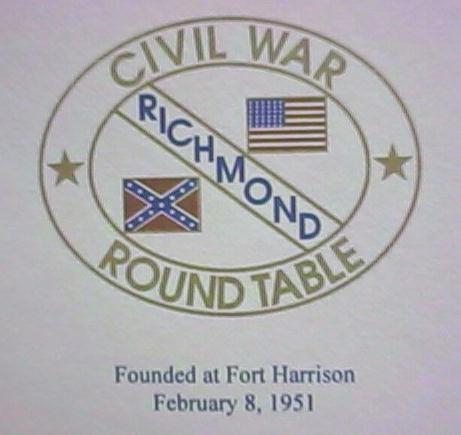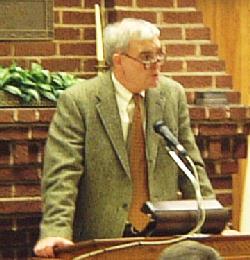


April 2002
Clark H. Lewis, President Art & Carol Bergeron, Editors P. O. Box 1122 3901 Paces Ferry Road Richmond, VA 23218 Chester, VA 23831-1239 April 2002 PROGRAM
Dr. Edward C. Smith "The Civil War Through the Eyes of Lincoln, Lee, and Douglas" 8:00 p.m., Tuesday, April 9, 2002, at the Boulevard United Methodist Church, 321 N. Boulevard, Richmond, VA (corner of Boulevard and Stuart Ave.) The Round Table is happy to have Professor Edward C. Smith of American University as our April speaker. He is well known in Civil War circles and has sparked much debate with his often controversial views of the war and Southern leadership. Professor Smith is a third generation Washingtonian and the Director of American Studies and Special Assistant to the Dean of the College of Arts and Sciences. He has taught at American University since 1969. He is also a Civil War, African-American Cultural Heritage, and Art History Lecturer and Study Tour Leader for the Smithsonian Institution, National Georgraphic Society, and National Park Service. He has served as a consultant to numerous federal agencies, including the U. S. Senate, and in 1977-1978, he took a leave of absence from teaching to work at The White House as a presidential speechwriter during the Carter administration. Smith's writings have appeared in The Yale Review, The Washington Post, The Military Review, The Gettysburg National Battlefield Journal, The Wall Street Journal, Washington History, The Lincoln Review, and numerous other publications. He is an Honorary Cabinet Member of the Jefferson Davis Presidential Library and Museum in Beauvoir, Mississippi, and a member of the Board of Directors of the Abraham Lincoln Institute of The Library of Congress. Smith is currently writing two books on the Civil War. In 1991, he was awarded the American University's Distinguished Faculty Award. Most recently an endowed scholarship has been named in his honor at the University of Richmond to further the study of the Civil War era and beyond. He was also made a Distinguished Honorary Member of the Virginia Division of the Sons of Confederate Veterans. Article by Dr. Smith
Review of the March Program
 |
Announcements
April Raffle This month's raffle prize is the new book A Scythe of Fire: The Civil War Story of the Eighth Georgia Infantry Regiment, by Warren Wilkinson and Steven E. Woodworth. Read Danny Witt's review of this book.
Spring Field Trip The Richmond Civil War Round Table's Spring field trip will be on May 4 and will a visit to the Averasboro and Bentonville battlefields in North Carolina. Mark L. Bradley will be the tour guide. Bradley is a native North Carolinian and the author of Last Stand in the Carolinas: The Battle of Bentonville and This Astounding Close: The Road to Bennett Place. He is an experience tour guide and should make this a memorable trip. Cost for the trip will be $30.00 per person. The bus will depart from the shopping center parking lot at the corner of Brook Road and Parham at 6:30 a.m. Return will be around 6:30 p.m. that evening. Please bring a lunch and drinks. Morning and afternoon snacks will be furnished. You can make a reservation by giving your check to Art Bergeron at one of the meetings or by mailing it to: Art Bergeron 3901 Paces Ferry Road Chester, VA 23831-1239
Civil War Classes at University of Richmond Dr. Jack Mountcastle is offering the following two classes. They will be held from 7:00 - 9:30 P.M., and the fee for each one is $31.00. On Monday, April 15, the topic will be Joshua Lawrence Chamberlain. This evening, the class will look closely at the man and his family, the troops he led in battle, and his leadership style. On Monday, May 13, the topic will be John Brown Gordon. The class will look closely at this Confederate general from Georgia who was wounded in action five times and selected to serve as commander of Confederate troops during the official surrender ceremony at Appomattox. Call the School of Continuing Studies at 804-289-8133 for registration information. Their hours are 8:30 a.m. - 7:00 p.m., M - Th, and 8:30 a.m. - 5:00 p.m. Friday.
Ukrops' Golden Gift Program Once again this year, we will be collecting Ukrops' receipts from its Golden Gift Program to benefit the Richmond Battlefields Association (RBA). Please remember to solicit these receipts from friends and co-workers who may otherwise not donate them to any particular organization. Your support of the RBA is greatly appreciated.
Volunteer Needed The Round Table needs a volunteer to take responsibility for setting up snacks for our monthly meeting. Please see Richard Grosse for details or call him at 798-1051. Thanks in advance.
RCWRT Monthly Speakers for 2002
Newsletter Deadlines To facilitate the printing and timely distribution of the monthly newsletter, information for it should be submitted to the editors no later than the following dates: for May; May 24 for June; June 21 for July; July 19 for August; August 23 for September; September 20 for October; October 18 for November; and November 22 for December
Richmond Civil War Round Table Newsletter Art & Carol Bergeron, Editors 3901 Paces Ferry Road Chester, VA 23831-1239
Return to News Letters Index
Return to main page

©R.C.W.R.T. 2002